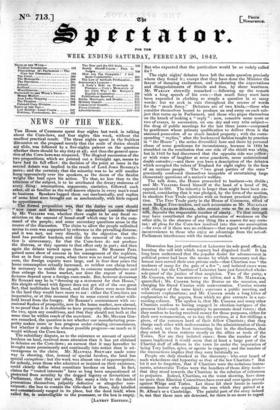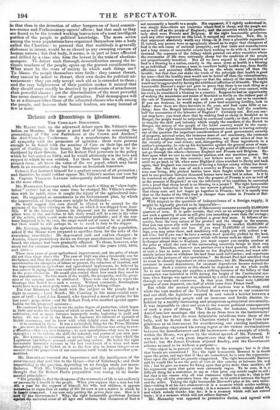Dissension has just performed at Leicester its sole good office,
in bursting the veil with which roguery had disguised itself. It has
long been understood that the popular desire for advancement in pohtical power had been the means by which mercenary and dis- honest men served their own private ends—that Chartism was " the madness of many for the gain of a few " ; and isolated cases were detected : but the Chartists of Leicester have just furnished whole- sale proof of the justice of that suspicion. Two of the party, a Mr. COOPER, who was moreover an editor, and a Mr. MAREHast, quarrelled ; Mr. Coosa being the Brutus on the occasion, and charging his friend Cassius with maleversation. Cassius retorts with charges of the same kind ; convenes a public meeting, and volunteers explanations ; and Mr. COOPER sends a long letter of explanation to the papers, from which we give extracts in a suc- ceeding column. The upshot is, that Mr. COOPER and many other Chartists confess to having engaged in election-intrigues of the grossest kind—such as conspiracy to personate dead voters ; that they confess to having received money for those purposes, either for their own remuneration, or to buy the services, at a few shillings a piece, of the common herd of their fellow Chartists ; that they charge each other with maleversation in the administration of those
funds ; and, not the least interesting fact in the disclosure, that they acted in these matters mostly as the allies or tools of the Tories. Nor are they isolated cases : from the number of the names implicated it would seem that at least a large part of the Chartist staff of officers in the town lie under the imputation of being Tory bullies, spies, or agents in roguery ; and the number of the transactions implies that they were habitually so.
People are duly shocked at the discovery : who ever heard of such wickedness and hypocrisy as that of the low Chartists ? But let it not be forgotten, that if Chartists were the nefarious instru- ments, aristocratic Tories were the handlers of those dirty tools— that they stood towards the Chartists in the relation of suborners to perjurers. Indeed, Chartists, on the worst showing, have done no more than Election Committees have over and over again proved against Whigs and Tories. Let those lift their hands in sancti-
monious horror who repudiate the vote which they gained at a St. Alban's or a Cambridge. The painful part of the story indeed is, not that these men are detected, for there is no more to regret in that than in the detection of other hangers-on of local commit- tee-rooms and Parliamentary-agents' offices ; but that such as they are found to be the trusted working instructers of a most intelligent portion of the people in political knowledge. The more active among the town populations have organized themselves into a body called the Chartists : to pretend that that multitude is generally dishonest in intent, would be as absurd as any sweeping censure of human nature ; but that body, it seems, is in part at least officered and drilled by a class who form the lowest in the train of election- mongers. To detect such thorough demoralization among the in- timate teachers of the people, opens up the gravest considerations. What must be the state of society in which such things are ? To blame the people themselves were futile : they cannot thwart, they cannot be asked to thwart, their own desire for political ad- trancement : they can only accept such aid as is extended to them ; and the very helplessness of their position makes it natural that they should more readily be deceived by professions of attachment than powerful classes ; yet the discrimination of the most powerful has never destroyed the race of parasites. Paid demagogues will be at a discount when those of the educated classes who walk among the people, and become their honest leaders, are many instead of few or none.



























 Previous page
Previous page